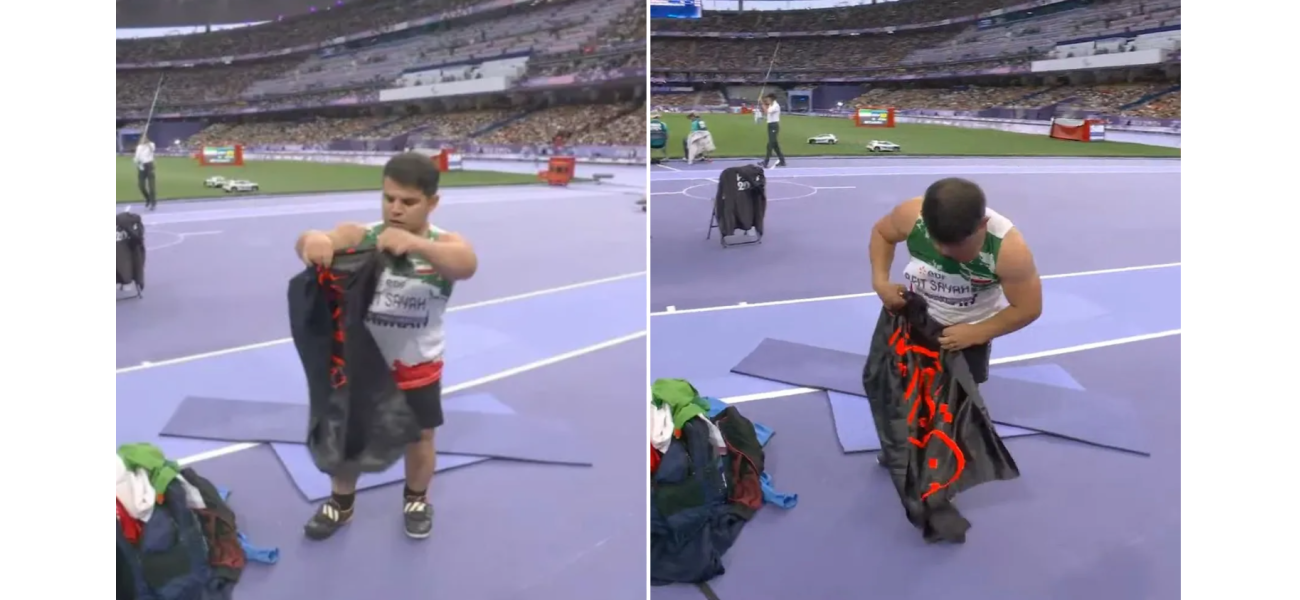Paralympian loses gold for showing forbidden flag.
A divisive conclusion.
September 8th 2024.

After achieving victory in the men's F41 Javelin final in Paris, Iranian Paralympic athlete Sadegh Beit Sayah proudly unfurled a religious flag. However, his joy was short-lived as he was controversially stripped of his gold medal. Despite setting a new Paralympic record with a throw of 47.64 meters, Beit Sayah received two yellow cards for separate incidents during the event. This led to his disqualification just moments before the medal ceremony.
The first yellow card was given to Beit Sayah during the event when he appeared to make a "throat-slitting" gesture after breaking the record with his second throw. This was followed by a second yellow card and subsequent disqualification when he unfurled a black flag with red writing while celebrating his victory. As a result, Indian para-athlete Navdeep Singh was promoted to gold, with China's Sun Pengxiang and Iraq's Wildan Nukhailawi taking silver and bronze respectively.
According to the Paralympic website, Beit Sayah's disqualification was based on rule 8.1 of the International Paralympics Committee regulations, which states that all participants must abide by the IPC Code of Ethics and the World Para Athletics Code of Conduct. In addition, his unfurling of the religious flag was a violation of rule 1.11 of the IPC Code of Ethics, which prohibits athletes from using the Paralympic Games to promote any political agenda.
Iran launched an appeal to overturn the disqualification, but their efforts were unsuccessful. Speaking after the incident, an emotional Beit Sayah explained that the flag held no political meaning and was simply a religious symbol in honor of Hazrat Ummul Banin, the wife of Ali ibn Abi Talib, the first Shia Imam. He also mentioned that he had unfurled a similar flag at the Tokyo Paralympics, where he won a silver medal, without facing any consequences. It is possible that he only received one yellow card on that occasion, thus avoiding disqualification.
Aliasghar Hadizadeh, the head of Iran's Para-Athletics Association, defended Beit Sayah's actions and stated that the "throat-slitting" gesture was commonly performed by athletes after breaking a record. He also explained that the flag was not given to Beit Sayah by officials, but rather he had brought it himself as a sign of devotion. Unfortunately, this led to his second yellow card and subsequent disqualification.
Hadizadeh further emphasized that the athlete's behavior was misinterpreted by the referee and that the team immediately protested the decision. However, upon reviewing the videos of the competition, it was deemed that Beit Sayah's actions were not in line with the rules and he was disqualified. Hadizadeh also addressed the tradition of athletes passing their hands over their necks as a sign of breaking a record, which may have been misunderstood in this case.
In the end, Beit Sayah's disqualification was a result of unfortunate miscommunication and misinterpretation. Despite his innocence, he was unable to defend his gold medal and Paralympic record. As a team, Iran protested the decision, but ultimately, the rules were enforced. It is a lesson for all athletes to be mindful of their actions and gestures, especially in a highly competitive and regulated environment like the Paralympics.
The first yellow card was given to Beit Sayah during the event when he appeared to make a "throat-slitting" gesture after breaking the record with his second throw. This was followed by a second yellow card and subsequent disqualification when he unfurled a black flag with red writing while celebrating his victory. As a result, Indian para-athlete Navdeep Singh was promoted to gold, with China's Sun Pengxiang and Iraq's Wildan Nukhailawi taking silver and bronze respectively.
According to the Paralympic website, Beit Sayah's disqualification was based on rule 8.1 of the International Paralympics Committee regulations, which states that all participants must abide by the IPC Code of Ethics and the World Para Athletics Code of Conduct. In addition, his unfurling of the religious flag was a violation of rule 1.11 of the IPC Code of Ethics, which prohibits athletes from using the Paralympic Games to promote any political agenda.
Iran launched an appeal to overturn the disqualification, but their efforts were unsuccessful. Speaking after the incident, an emotional Beit Sayah explained that the flag held no political meaning and was simply a religious symbol in honor of Hazrat Ummul Banin, the wife of Ali ibn Abi Talib, the first Shia Imam. He also mentioned that he had unfurled a similar flag at the Tokyo Paralympics, where he won a silver medal, without facing any consequences. It is possible that he only received one yellow card on that occasion, thus avoiding disqualification.
Aliasghar Hadizadeh, the head of Iran's Para-Athletics Association, defended Beit Sayah's actions and stated that the "throat-slitting" gesture was commonly performed by athletes after breaking a record. He also explained that the flag was not given to Beit Sayah by officials, but rather he had brought it himself as a sign of devotion. Unfortunately, this led to his second yellow card and subsequent disqualification.
Hadizadeh further emphasized that the athlete's behavior was misinterpreted by the referee and that the team immediately protested the decision. However, upon reviewing the videos of the competition, it was deemed that Beit Sayah's actions were not in line with the rules and he was disqualified. Hadizadeh also addressed the tradition of athletes passing their hands over their necks as a sign of breaking a record, which may have been misunderstood in this case.
In the end, Beit Sayah's disqualification was a result of unfortunate miscommunication and misinterpretation. Despite his innocence, he was unable to defend his gold medal and Paralympic record. As a team, Iran protested the decision, but ultimately, the rules were enforced. It is a lesson for all athletes to be mindful of their actions and gestures, especially in a highly competitive and regulated environment like the Paralympics.
[This article has been trending online recently and has been generated with AI. Your feed is customized.]
[Generative AI is experimental.]
0
0
Submit Comment





